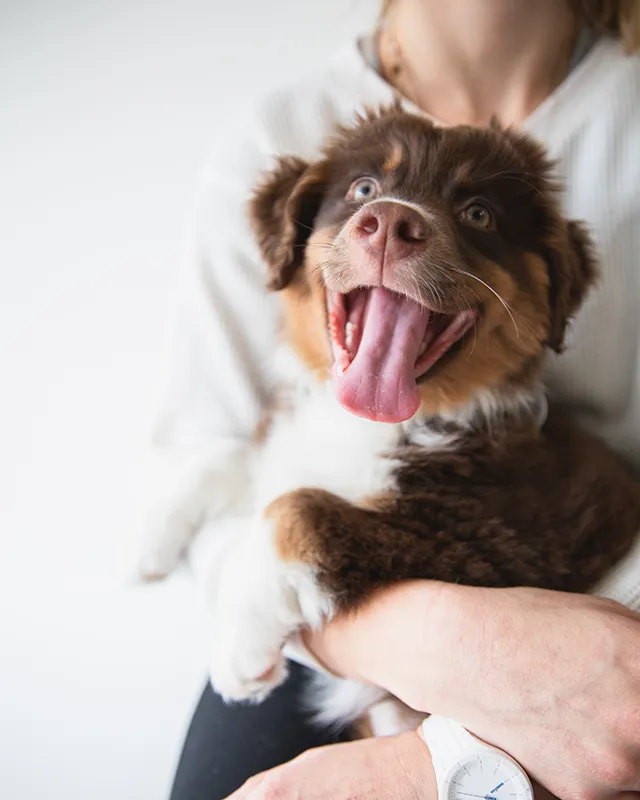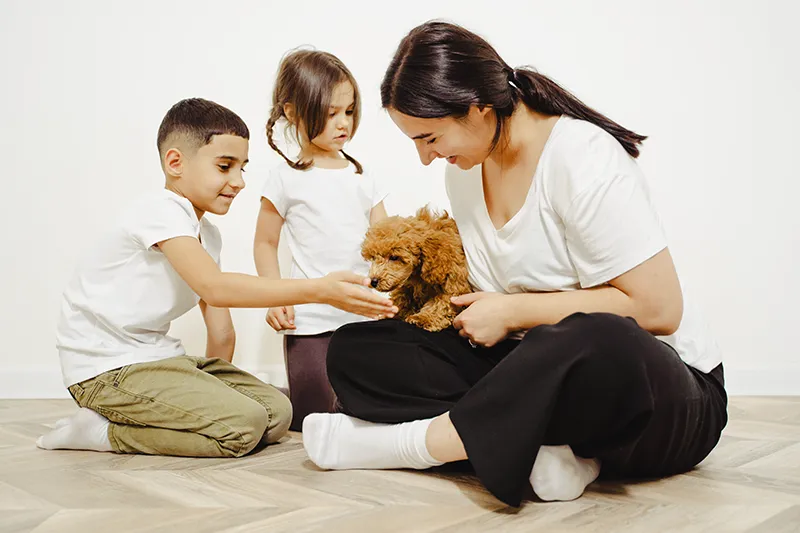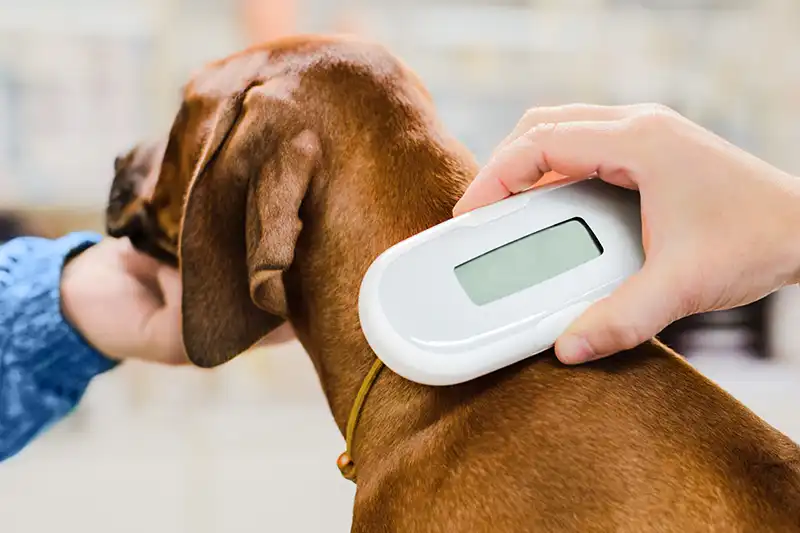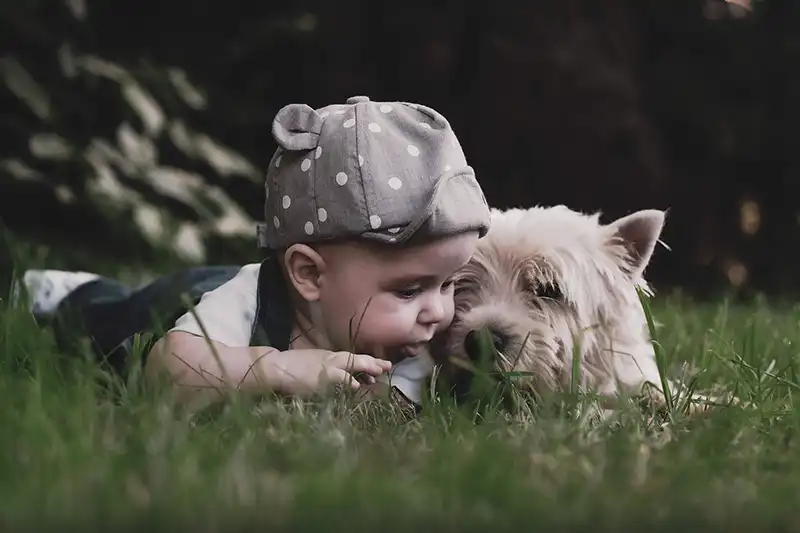Congratulations on your new puppy!
What you need to know to keep them healthy and happy!
HEAL Veterinary Hospital is your partner in helping your puppy get started on the right paw! These early months of life are important in determining the health, behavior and well-being of the adult dog your puppy will become.
The Basics
PET INSURANCE
Now is the time to sign your dog up for pet health insurance! This coverage is significantly less expensive if you obtain it early in your puppy’s life and will help cover many major veterinary expenses that occur when he’s older. According to pet insurance agencies, any conditions found prior to insurance are considered as pre-existing and will therefore, NOT be covered.
REGULAR EXAMS
Starting at 8 weeks of age, we’ll check for congenital issues, soundness of body and signs of infectious issues. Please bring a fresh (within 24 hours) fecal sample in a labeled and sealed plastic bag. This is so we can screen for internal parasites. We’ll also discuss external parasites (fleas and ticks); never use parasite preventative not approved for puppies on your baby.
VACCINATING YOUR PUPPY
Vaccinations with boosters are especially important for young puppies as they do not have full immunity from many serious infectious diseases. Puppies are commonly given a series of combo vaccinations against distemper, adenovirus-2, parainfluenza and parvovirus (DHPP), as well as, leptospirosis and Bordetella. When they are old enough, they’ll need rabies vaccinations, which are required by law.
Other vaccinations, such Lyme and Influenza, can be given as well, depending upon your dog’s lifestyle. We give vaccinations in a series, two-four weeks apart, so your baby will have maximum immunity for fighting infectious diseases. It’s critical to ensure your puppy has completed the entire series of combo vaccinations to keep them protected.
Vaccination Schedule
8 weeks of age: DA/HhHPP, Bordetella
10 weeks of age: DA/HPP, Leptospirosis
12 weeks of age: Rabies, Lyme OR Influenza
14-16 weeks of age: DA/HPP, Leptospirosis, Lyme and Influenza
6 months of age: pre-op bloodwork, spay/neuter, and Bordetella Booster
PARASITE PREVENTION
Fleas, ticks and heartworm-carrying mosquitoes can transmit nasty diseases to your puppy, which is why we recommend year-round parasite protection.
As the name suggests, heartworms live in the heart, and they can also thrive in the lungs and blood vessels. Because they constrict blood flow, they can damage internal organs and cause lung disease and heart failure. Treatment for heartworm is harsh and expensive, which is why year-round prevention is your dog’s best defense.
We recommend Simparica Trio monthly chews because they treat fleas, ticks and heartworms and can be started on pups as young as 8 weeks old. Other options include separate oral or topical heartworm and flea and tick preventatives.
For more information, visit the American Heartworm Society, which has guidelines and information for detection, treatment and prevention of heartworms.
SPAY/NEUTER
Spaying or neutering your dog has health benefits, in addition to helping with pet overpopulation. Neutering your male pet helps prevent testicular cancer and certain prostate problems while spaying helps prevent mammary gland tumours/cancer and uterine cancer. Most female dogs will go into heat by 6-8 months of age, for indoor large breeds doggie diapers may need to be considered.
Spay or neuter your puppy at 6 months of age if under 50 lbs., and at 12-18 months, if over 50 lbs. This is because research has shown a trend towards orthopedic/bony cancer and early spaying/neutering in large breed dogs.
Nutrition & Hygiene
WHAT TO FEED YOUR PUPPY
Your baby needs lots of calories to grow strong, so offer plenty of food formulated specifically for puppies. Dogs thrive on routine, so offer food at the same time three times. Give him a chance to go potty after eating, and always provide plenty of fresh water.
Use premium canned food to fill Kong-like toys. Freeze it and you’ll have a great treat that will keep him happily occupied, especially when you are working on leaving him alone or crate training.
The diet you select for your puppy should help him grow healthy and strong—another reason for regular health exams that include weight measurement. We’d be happy to help you select the most appropriate diet for your growing pup. Our favourite brands are Royal Canin puppy, Hill’s Science Diet puppy or commercial brands like Purina Proplan or Eukanuba puppy.
When your puppy is about 6 months old transition to twice a day feedings. You can begin adult food when your dog is 12 months old.
BATHS AND TOOTH BRUSHING
If a bath is necessary, you can bathe a puppy that is at least 8 weeks of age. Use only puppy shampoo, and never allow any water or shampoo to get inside your little one’s mouth, ears or eyes. An oatmeal-based shampoo is very moisturizing and gentle. Dry with a soft fluffy towel and allow drying in a nice warm room. Make sure your puppy stays warm after bathing to decrease illness.
Brushing your puppy’s teeth helps to keep them healthy and plaque free. Teeth brushing should begin when your puppy is 6 months old and all their adult teeth have erupted. Providing home dental care early can help delay the need for a cleaning and protect your puppy’s teeth while getting him used to having his mouth handled. We really like finger brushes for this!
Comfort & Safety
SOCIALIZATION
Puppies need socialization, or exposure to new things, in the first four months of their lives to help them grow into happy, confident adult dogs. At this stage, their curiosity about new things outweighs their fear of the unknown. After four months of age, the window of opportunity starts to close, and new things may cause stress instead. Puppies could develop behavioral issues like fear aggression, separation anxiety or dog-to-dog reactivity if they aren’t properly socialized as puppies.
Start by slowly introducing your puppy to your family and friends; no big parties that may overwhelm him! He can meet respectful dogs one by one, but stay away from dog parks because there may be unvaccinated dogs playing there.
Practice handling for future visits to the vet or groomer by slowly massaging all parts of the body, including paws so nail trimming won’t be scary. Expose your puppy to new sounds like the vacuum cleaner or the doorbell. Sing, read or simply talk to your baby, and reward generously if he responds to his name. Never yell at your puppy, no matter how frustrated you may be. He’ll learn to fear you and you won’t develop the bond that you both want and need.
Just like people, each dog is an individual. Any dog is capable of being friendly, social, fearful or aggressive. Get to know your puppy’s specific personality and traits. Respect him for who he is and he’ll be your best friend for life!
MICROCHIPPING
This small transmitter is your pet’s ticket home if he becomes lost. Insertion usually causes very little pain; however, many pet parents opt to have this done while their pet is anesthetized for spay/neuter surgery.
The microchip is contained in a capsule smaller than a grain of rice and is non-toxic, hypoallergenic and completely safe. A simple procedure places the chip just under the skin. These microchips never need to be removed or recharged during your pet’s lifetime.
Pro-tip- If you activate and keep up with annual membership you will have access to pet poison control which can be useful if your puppy ingests a toxic substance.
EXERCISE
Dogs need adequate exercise because regular workouts support skeletomuscular and cardiovascular health. After he has completed his vaccinations, you can take your puppy on short walks.
Let him get to know his new neighborhood by walking around the block and then slow increasing distance in concentric circles as he becomes more confident.
Follow your pup’s lead; don’t go too far too fast and be sure to let him stop and sniff. Teach him to walk nicely on a loose leash and always take plenty of treats with you on walks to reward good behavior. You can exercise at home too, by playing ball and teaching him to fetch. Get him used to stairs, and they can become part of his workout, too, especially on rainy days.
CHILDREN AND YOUR NEW PUPPY
Remember, safety first. Any dog or cat will bite if provoked. Children are fast-moving, loud and unaware of an animal’s body language. They are tempted to hug and kiss dogs or disturb a sleeping animal, which can lead to bites and scratches. Never allow your child to climb on a dog, pull his ears or tease him. Unfortunately, social media is full of photos and videos depicting children in unsafe situations with pets because parents unknowingly think it looks “cute.”
Learn and teach children about animal body language. Make sure your puppy has some quiet time when he can decompress if you have a rowdy, active family. And never leave young children unsupervised with any pet no matter how well you think you know the animal.
Health Calendar
| Approximate Age | |
| 8 weeks | · Wellness Exam · DA/HPP · Bordetella |
| 10 weeks | · DA/HPP · Leptospirosis |
| 12 weeks | · Rabies vaccine, booster vaccine in 1 year · Lyme or Influenza |
| 14-16 weeks | · DA/HPP · Leptospirosis · Lyme · Influenza |
| 6 months | · Pre-Op Bloodwork · Spay or neuter procedure |













